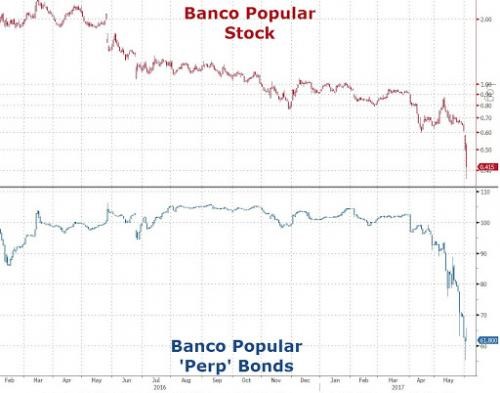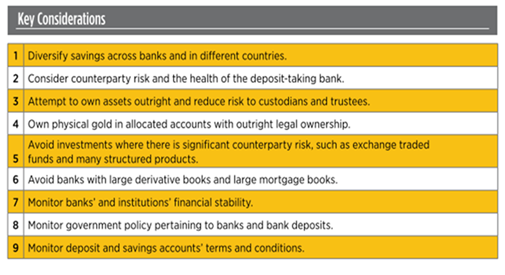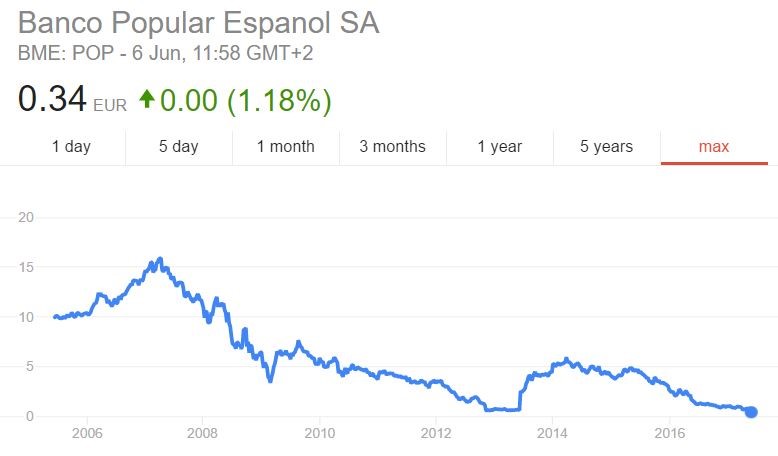Deposit Bail In Risk As Spanish Bank's Stock Crash
- Deposit bail in risk as stocks and bonds of Spanish bank - Banco Popular - crash
- Banco Popular stock crashes most on record - down 63% this year to 34 euro cents
- Spanish bank tells employees - "Don't panic"
- Risk of Spanish banking crisis as Banco Popular credit curve inverts
- Banco Popular needs to find at least ?,?4 billion more capital - analysts
- Deposits over ?,?100,000 (euro) vulnerable to bail-in
- EU, U.S., UK push for bank bail-ins' poses risks to depositors
Source: Google
Banco Popular's shares crashed another 17 per cent yesterday to record lows amid concerns the Spanish bank may have to be "wound down" and could see bail-ins of investors and depositors.
There are increasing fears that there is no buyer for the bank and this saw its share price dropped to ?,?0.34 (34 euro cents). The bank's stocks had already fallen nearly 50 per cent in the last week and is down 63% this year.
Shares also fell sharply last Friday as hoped for buyers dropped out of the Banco Popular auction process. Final bids are due this week and international publications have reported that Spanish banking rivals BBVA and Bankia had been interested.

Source: Zero Hedge
Analysts estimate that the bank needs at least ?,?4 billion more capital and it is burdened with a likely insurmountable ?,?37 billion pile of toxic property loans and assets.
Banco Popular is Spain's sixth-largest bank and there is a debate as to whether it is systematically important. It likely is as it has the largest amount of small business customers in Spain. These companies are the backbone of the Spanish economy and now vulnerable to having their deposits over ?,?100,000 confiscated in bank bail-ins.
The bank is also used by many of Spain's wealthy catholic individuals and institutions including one of Spain's most influential institutions - Opus Dei.
The badly debt laden bank may have to liquidate as neither a buyer nor a new capital raise appear likely. It now looks possible that Spain may be the first nation to have the EU's new BRRD "bail-in" insolvency directive involving bank "resolution" imposed on it.
According to Bloomberg:
"Resolution is the process of restructuring a bank that's too systemically important to be liquidated in a normal insolvency process. If a supervisor determines that a lender is failing or likely to fail, it gets turned over to the resolution authority.
For major banks in the euro area, that's the Single Resolution Board, led by Elke Koenig. The restructuring of the bank is supposed to be funded primarily by imposing losses on creditors, including senior bondholders if necessary."
It also involves depositors of up to ?,?100,000 suffering "haircuts" and having their deposits bailed-in.
Deposit bail in is one of the greatest financial risks to investors, savers and indeed companies internationally today. Yet it remains the most poorly covered financial risk and is largely ignored by financial advisers, brokers and not surprisingly governments and banks.

The bail-in regime and confiscating deposits, especially from job creating companies, would be extremely deflationary and would likely contribute to severe recessions. This is something we warned of when we conducted our extensive research on the developing global bail-in regimes after the Cyprus bail-ins in 2013.
Diversification of deposits remains vital and another important way to protect against deposit bail in is diversification into physical gold. Owning gold bullion coins and bars in allocated and segregated storage in the safest vaults in the world is prudent given the deposit bail in risk.
********
